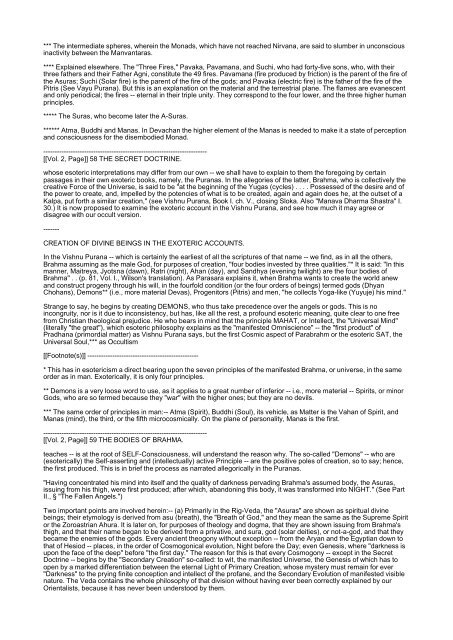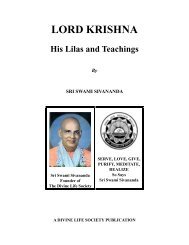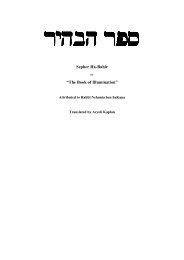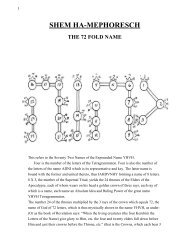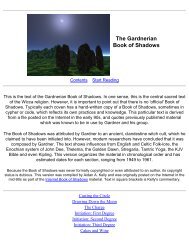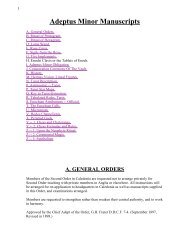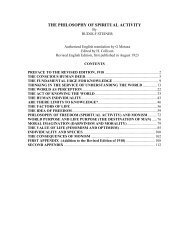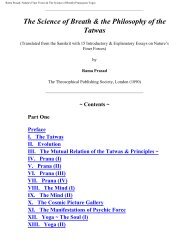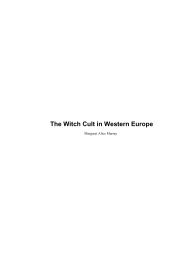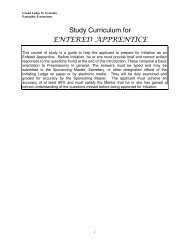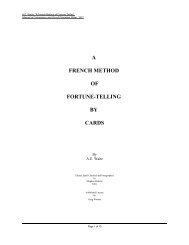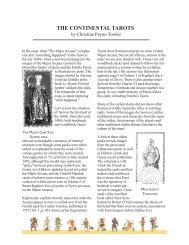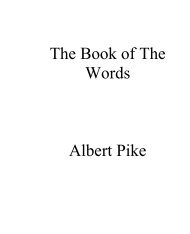Band 2 Anthropogenesis - H.P. Blavatsky
Band 2 Anthropogenesis - H.P. Blavatsky
Band 2 Anthropogenesis - H.P. Blavatsky
You also want an ePaper? Increase the reach of your titles
YUMPU automatically turns print PDFs into web optimized ePapers that Google loves.
*** The intermediate spheres, wherein the Monads, which have not reached Nirvana, are said to slumber in unconscious<br />
inactivity between the Manvantaras.<br />
**** Explained elsewhere. The "Three Fires," Pavaka, Pavamana, and Suchi, who had forty-five sons, who, with their<br />
three fathers and their Father Agni, constitute the 49 fires. Pavamana (fire produced by friction) is the parent of the fire of<br />
the Asuras; Suchi (Solar fire) is the parent of the fire of the gods; and Pavaka (electric fire) is the father of the fire of the<br />
Pitris (See Vayu Purana). But this is an explanation on the material and the terrestrial plane. The flames are evanescent<br />
and only periodical; the fires -- eternal in their triple unity. They correspond to the four lower, and the three higher human<br />
principles.<br />
***** The Suras, who become later the A-Suras.<br />
****** Atma, Buddhi and Manas. In Devachan the higher element of the Manas is needed to make it a state of perception<br />
and consciousness for the disembodied Monad.<br />
------------------------------------------------------------------------<br />
[[Vol. 2, Page]] 58 THE SECRET DOCTRINE.<br />
whose esoteric interpretations may differ from our own -- we shall have to explain to them the foregoing by certain<br />
passages in their own exoteric books, namely, the Puranas. In the allegories of the latter, Brahma, who is collectively the<br />
creative Force of the Universe, is said to be "at the beginning of the Yugas (cycles) . . . . Possessed of the desire and of<br />
the power to create, and, impelled by the potencies of what is to be created, again and again does he, at the outset of a<br />
Kalpa, put forth a similar creation," (see Vishnu Purana, Book I. ch. V., closing Sloka. Also "Manava Dharma Shastra" I.<br />
30.) It is now proposed to examine the exoteric account in the Vishnu Purana, and see how much it may agree or<br />
disagree with our occult version.<br />
-------<br />
CREATION OF DIVINE BEINGS IN THE EXOTERIC ACCOUNTS.<br />
In the Vishnu Purana -- which is certainly the earliest of all the scriptures of that name -- we find, as in all the others,<br />
Brahma assuming as the male God, for purposes of creation, "four bodies invested by three qualities."* It is said: "In this<br />
manner, Maitreya, Jyotsna (dawn), Ratri (night), Ahan (day), and Sandhya (evening twilight) are the four bodies of<br />
Brahma" . . (p. 81, Vol. I., Wilson's translation). As Parasara explains it, when Brahma wants to create the world anew<br />
and construct progeny through his will, in the fourfold condition (or the four orders of beings) termed gods (Dhyan<br />
Chohans), Demons** (i.e., more material Devas), Progenitors (Pitris) and men, "he collects Yoga-like (Yuyuje) his mind."<br />
Strange to say, he begins by creating DEMONS, who thus take precedence over the angels or gods. This is no<br />
incongruity, nor is it due to inconsistency, but has, like all the rest, a profound esoteric meaning, quite clear to one free<br />
from Christian theological prejudice. He who bears in mind that the principle MAHAT, or Intellect, the "Universal Mind"<br />
(literally "the great"), which esoteric philosophy explains as the "manifested Omniscience" -- the "first product" of<br />
Pradhana (primordial matter) as Vishnu Purana says, but the first Cosmic aspect of Parabrahm or the esoteric SAT, the<br />
Universal Soul,*** as Occultism<br />
[[Footnote(s)]] -------------------------------------------------<br />
* This has in esotericism a direct bearing upon the seven principles of the manifested Brahma, or universe, in the same<br />
order as in man. Exoterically, it is only four principles.<br />
** Demons is a very loose word to use, as it applies to a great number of inferior -- i.e., more material -- Spirits, or minor<br />
Gods, who are so termed because they "war" with the higher ones; but they are no devils.<br />
*** The same order of principles in man:-- Atma (Spirit), Buddhi (Soul), its vehicle, as Matter is the Vahan of Spirit, and<br />
Manas (mind), the third, or the fifth microcosmically. On the plane of personality, Manas is the first.<br />
------------------------------------------------------------------------<br />
[[Vol. 2, Page]] 59 THE BODIES OF BRAHMA.<br />
teaches -- is at the root of SELF-Consciousness, will understand the reason why. The so-called "Demons" -- who are<br />
(esoterically) the Self-asserting and (intellectually) active Principle -- are the positive poles of creation, so to say; hence,<br />
the first produced. This is in brief the process as narrated allegorically in the Puranas.<br />
"Having concentrated his mind into itself and the quality of darkness pervading Brahma's assumed body, the Asuras,<br />
issuing from his thigh, were first produced; after which, abandoning this body, it was transformed into NIGHT." (See Part<br />
II., § "The Fallen Angels.")<br />
Two important points are involved herein:-- (a) Primarily in the Rig-Veda, the "Asuras" are shown as spiritual divine<br />
beings; their etymology is derived from asu (breath), the "Breath of God," and they mean the same as the Supreme Spirit<br />
or the Zoroastrian Ahura. It is later on, for purposes of theology and dogma, that they are shown issuing from Brahma's<br />
thigh, and that their name began to be derived from a privative, and sura, god (solar deities), or not-a-god, and that they<br />
became the enemies of the gods. Every ancient theogony without exception -- from the Aryan and the Egyptian down to<br />
that of Hesiod -- places, in the order of Cosmogonical evolution, Night before the Day; even Genesis, where "darkness is<br />
upon the face of the deep" before "the first day." The reason for this is that every Cosmogony -- except in the Secret<br />
Doctrine -- begins by the "Secondary Creation" so-called: to wit, the manifested Universe, the Genesis of which has to<br />
open by a marked differentiation between the eternal Light of Primary Creation, whose mystery must remain for ever<br />
"Darkness" to the prying finite conception and intellect of the profane, and the Secondary Evolution of manifested visible<br />
nature. The Veda contains the whole philosophy of that division without having ever been correctly explained by our<br />
Orientalists, because it has never been understood by them.


